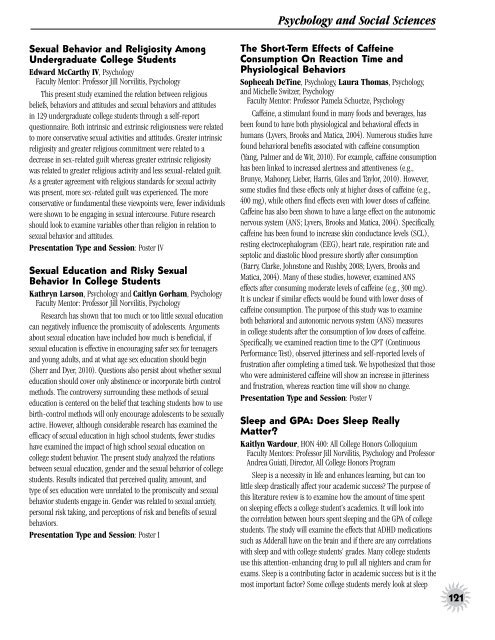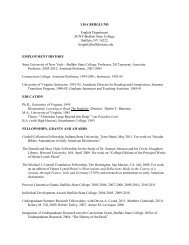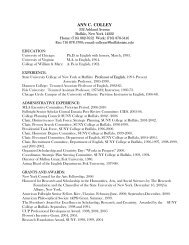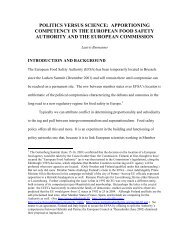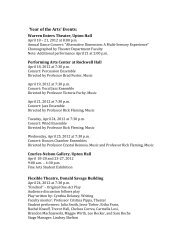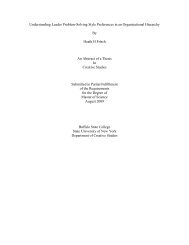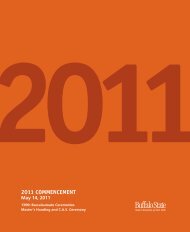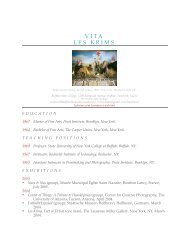Arts - Buffalo State College
Arts - Buffalo State College
Arts - Buffalo State College
Create successful ePaper yourself
Turn your PDF publications into a flip-book with our unique Google optimized e-Paper software.
Sexual Behavior and Religiosity Among<br />
Undergraduate <strong>College</strong> Students<br />
Edward McCarthy IV, Psychology<br />
Faculty Mentor: Professor Jill Norvilitis, Psychology<br />
This present study examined the relation between religious<br />
beliefs, behaviors and attitudes and sexual behaviors and attitudes<br />
in 129 undergraduate college students through a self-report<br />
questionnaire. Both intrinsic and extrinsic religiousness were related<br />
to more conservative sexual activities and attitudes. Greater intrinsic<br />
religiosity and greater religious commitment were related to a<br />
decrease in sex-related guilt whereas greater extrinsic religiosity<br />
was related to greater religious activity and less sexual-related guilt.<br />
As a greater agreement with religious standards for sexual activity<br />
was present, more sex-related guilt was experienced. The more<br />
conservative or fundamental these viewpoints were, fewer individuals<br />
were shown to be engaging in sexual intercourse. Future research<br />
should look to examine variables other than religion in relation to<br />
sexual behavior and attitudes.<br />
Presentation Type and Session: Poster IV<br />
Sexual Education and Risky Sexual<br />
Behavior In <strong>College</strong> Students<br />
Kathryn Larson, Psychology and Caitlyn Gorham, Psychology<br />
Faculty Mentor: Professor Jill Norvilitis, Psychology<br />
Research has shown that too much or too little sexual education<br />
can negatively influence the promiscuity of adolescents. Arguments<br />
about sexual education have included how much is beneficial, if<br />
sexual education is effective in encouraging safer sex for teenagers<br />
and young adults, and at what age sex education should begin<br />
(Sherr and Dyer, 2010). Questions also persist about whether sexual<br />
education should cover only abstinence or incorporate birth control<br />
methods. The controversy surrounding these methods of sexual<br />
education is centered on the belief that teaching students how to use<br />
birth-control methods will only encourage adolescents to be sexually<br />
active. However, although considerable research has examined the<br />
efficacy of sexual education in high school students, fewer studies<br />
have examined the impact of high school sexual education on<br />
college student behavior. The present study analyzed the relations<br />
between sexual education, gender and the sexual behavior of college<br />
students. Results indicated that perceived quality, amount, and<br />
type of sex education were unrelated to the promiscuity and sexual<br />
behavior students engage in. Gender was related to sexual anxiety,<br />
personal risk taking, and perceptions of risk and benefits of sexual<br />
behaviors.<br />
Presentation Type and Session: Poster I<br />
Psychology and Social Sciences<br />
The Short-Term Effects of Caffeine<br />
Consumption On Reaction Time and<br />
Physiological Behaviors<br />
Sopheeah DeTine, Psychology, Laura Thomas, Psychology,<br />
and Michelle Switzer, Psychology<br />
Faculty Mentor: Professor Pamela Schuetze, Psychology<br />
Caffeine, a stimulant found in many foods and beverages, has<br />
been found to have both physiological and behavioral effects in<br />
humans (Lyvers, Brooks and Matica, 2004). Numerous studies have<br />
found behavioral benefits associated with caffeine consumption<br />
(Yang, Palmer and de Wit, 2010). For example, caffeine consumption<br />
has been linked to increased alertness and attentiveness (e.g.,<br />
Brunye, Mahoney, Lieber, Harris, Giles and Taylor, 2010). However,<br />
some studies find these effects only at higher doses of caffeine (e.g.,<br />
400 mg), while others find effects even with lower doses of caffeine.<br />
Caffeine has also been shown to have a large effect on the autonomic<br />
nervous system (ANS; Lyvers, Brooks and Matica, 2004). Specifically,<br />
caffeine has been found to increase skin conductance levels (SCL),<br />
resting electrocephalogram (EEG), heart rate, respiration rate and<br />
septolic and diastolic blood pressure shortly after consumption<br />
(Barry, Clarke, Johnstone and Rushby, 2008; Lyvers, Brooks and<br />
Matica, 2004). Many of these studies, however, examined ANS<br />
effects after consuming moderate levels of caffeine (e.g., 300 mg).<br />
It is unclear if similar effects would be found with lower doses of<br />
caffeine consumption. The purpose of this study was to examine<br />
both behavioral and autonomic nervous system (ANS) measures<br />
in college students after the consumption of low doses of caffeine.<br />
Specifically, we examined reaction time to the CPT (Continuous<br />
Performance Test), observed jitteriness and self-reported levels of<br />
frustration after completing a timed task. We hypothesized that those<br />
who were administered caffeine will show an increase in jitteriness<br />
and frustration, whereas reaction time will show no change.<br />
Presentation Type and Session: Poster V<br />
Sleep and GPA: Does Sleep Really<br />
Matter?<br />
Kaitlyn Wardour, HON 400: All <strong>College</strong> Honors Colloquium<br />
Faculty Mentors: Professor Jill Norvilitis, Psychology and Professor<br />
Andrea Guiati, Director, All <strong>College</strong> Honors Program<br />
Sleep is a necessity in life and enhances learning, but can too<br />
little sleep drastically affect your academic success? The purpose of<br />
this literature review is to examine how the amount of time spent<br />
on sleeping effects a college student’s academics. It will look into<br />
the correlation between hours spent sleeping and the GPA of college<br />
students. The study will examine the effects that ADHD medications<br />
such as Adderall have on the brain and if there are any correlations<br />
with sleep and with college students’ grades. Many college students<br />
use this attention-enhancing drug to pull all nighters and cram for<br />
exams. Sleep is a contributing factor in academic success but is it the<br />
most important factor? Some college students merely look at sleep<br />
121


